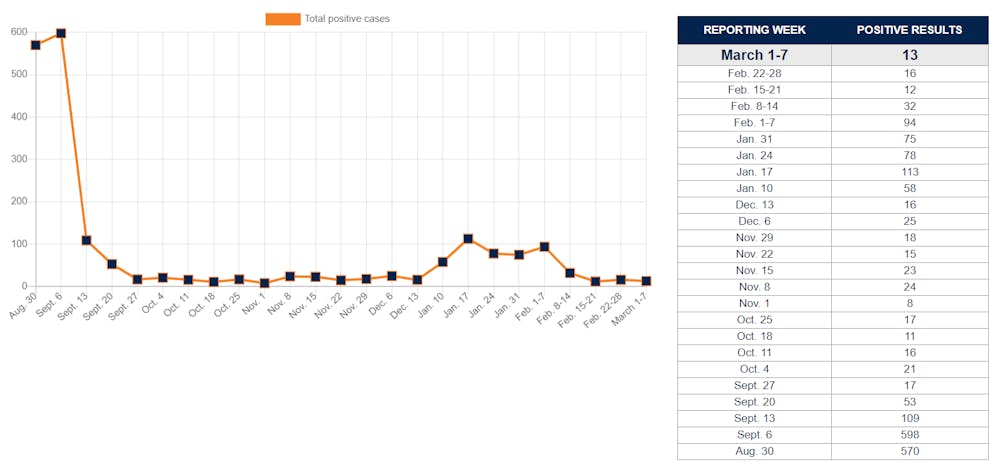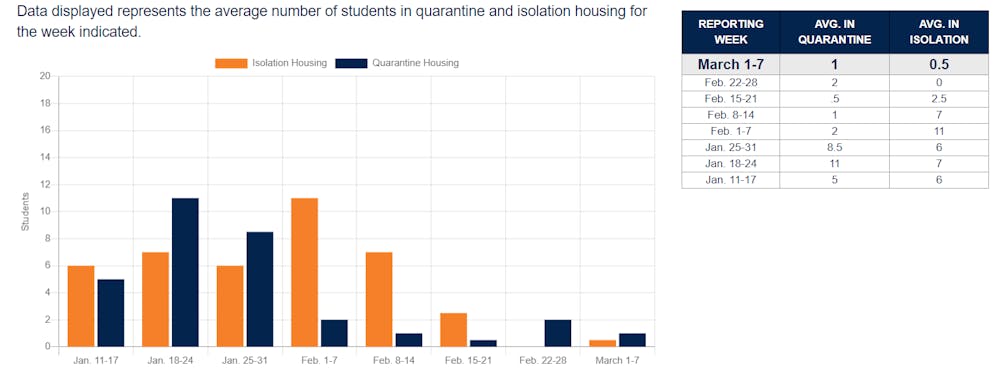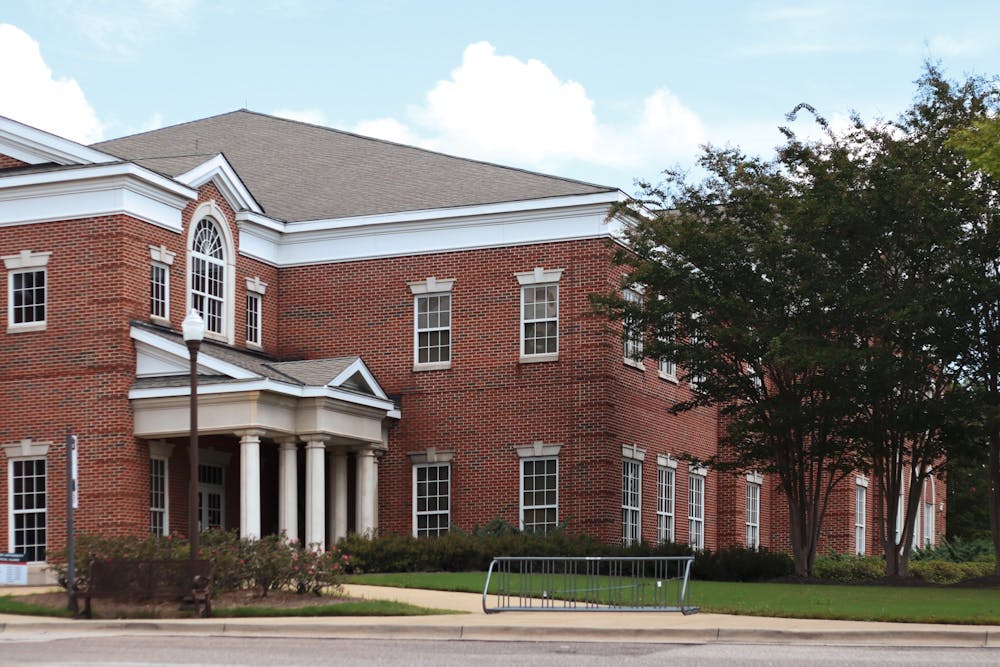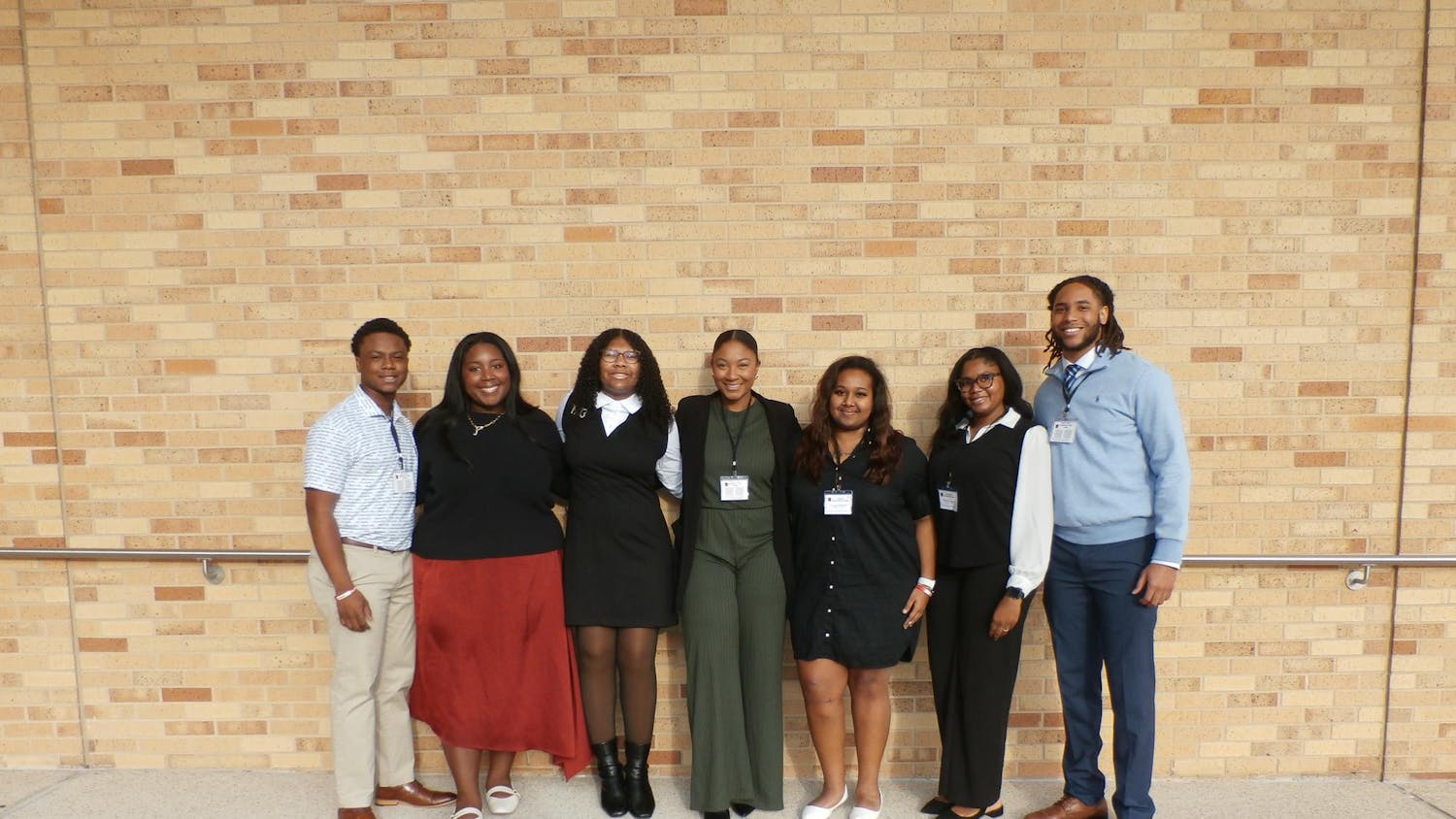The Centers for Disease Control and Prevention announced its first set of guidelines for fully vaccinated people on Monday, March 8, permitting some relaxing of safety protocols. Auburn University, however, said it will maintain its current indoor and outdoor mask and physical distancing guidelines, according to a campus-wide email sent Wednesday afternoon.
The University reported a total of 13 COVID-19 cases on campus during the week of March 1-7, according to the latest data from its COVID-19 Resource Center. This is a slight decrease from the previous week, where the University reported 16 cases during the week of Feb. 22-28.

The University determines COVID-19 cases through self-report forms from students and employees who indicate they have tested positive.
Auburn conducted 571 sentinel tests between March 1-7, one more test than the week before, with no tests during either week returning a positive result. An average of one student was moved to the University's quarantine housing while an average of 0.5 was staying in isolation housing.

The average number of students in quarantine or isolation housing has trended downward since early February.
The Auburn University Medical Clinic reported 19 positive COVID-19 tests from March 1-7 out of a total 319 tests taken, returning a positivity rate of 5.9%. Compared to Feb. 22-28, this is slightly higher as the clinic took a total of 336 tests during that week with 17 returning a positive result, or a 5.05% positivity rate. 2,234 phone calls were made to the clinic from March 1-7, according to the University.

The University said not all positive cases reported from the Med Clinic are from Auburn students, faculty and staff.
Dr. Fred Kam, director of the Med Clinic, said in his weekly update video that the University has seen "another great week" as COVID-19 cases have continued to decrease.
"The number of cases are down, the number of positive situations are down and we are 60 plus days into the semester, halfway in class days and a month since University employees returned to campus," Kam said. "We've not had any spikes, no issues, we're just kind of trucking along."
Kam commended Alabama Gov. Kay Ivey for her recent extension of the statewide mask mandate on Thursday, March 4, saying she made a wise decision. The extension means the University will also continue to require masks on campus property for the foreseeable future, he said.
"The virus has not gone anywhere [and] we are enjoying more personal freedoms because of the lower transmission of virus," Kam said. "We really need to continue our mask mandate for now, but we are definitely looking at changing parts of it going forward."
The University's mask requirement may change as this semester goes on, based on variables like new scientific findings about COVID-19, temperature and timing, according to Kam. University travel approval for faculty, however, has changed, Kam said. Faculty who wish to travel domestically for business purposes now only need to receive approval from their supervisor rather than the executive vice president or provost as of Monday, March 8.
"Auburn's senior leadership team rightfully made the decision for us to start putting the travel down at a supervisor level who is better able to talk individually with faculty or staff," he said. "The big decision now is: is the travel a 'need' or is the travel a 'want'?"
Kam said the U.S. is "fortunate" in that there did not appear to be a flu season this year, which the CDC believes is in part because of safety procedures against the coronavirus like wearing masks and social distancing. However, he said allergy season appears to be a constant and people should be aware symptoms are similar for COVID-19 and allergies.
"The symptoms consistent with allergies are also symptoms that can mimic COVID, so I think people need to consider that when you start developing nasal congestion, cough, all of those things," Kam said. "If you need to, you should seek medical care [and] if you need to, you should consider being tested if you know you had situations [where] more than likely you could have been exposed to COVID. Don't just always assume it's allergies."
Kam said wearing masks continues to be beneficial as they can decrease pollen exposure people may face in the spring.
Although an ever-increasing number of people are becoming vaccinated against COVID-19, Kam said testing remains important because coronavirus is still present and there have been no days yet with no reported positive cases.
"The testing centers are open, many of them are very available," he said. "At the clinic, we've got all versions of the tests — PCR, rapid antigen, rapid molecular, rapid antibody — everything's available so, yes, everything needs to continue."
Sentinel testing will continue, and Kam stressed that those invited should participate. He said sentinel tests can alert the University of any potential outbreaks. This is particularly important as more restrictions are lifted so that the University doesn't have to take "aggressive measures," Kam said.
Providing an update on the University's vaccination statistics, Kam said over 10,000 doses of COVID-19 vaccines have been administered on campus. The COVID-19 Resource Center reported that 5,419 first doses and 5,167 second doses have been administered as of March 5.
More people will receive invitations for their first dose in the coming weeks and everyone who was scheduled to receive their second before March 5 should have received an invitation by now, according to Kam.
Those in the latter group who have not received an invitation should contact the University's COVID-19 Resource Center, Kam said, unless they had a situation where they couldn't visit the Coliseum for their second shot, such as contracting COVID between doses or taking a medication that would postpone the next dose. One factor to consider is invitations may end up in one's spam folder, Kam said.
"We're switching back to giving first doses with the remainder of the vaccine that we have available, and that will happen this week," Kam said.
Do you like this story? The Plainsman doesn't accept money from tuition or student fees, and we don't charge a subscription fee. But you can donate to support The Plainsman.

Tim Nail, junior in journalism, is the campus editor for The Auburn Plainsman.





